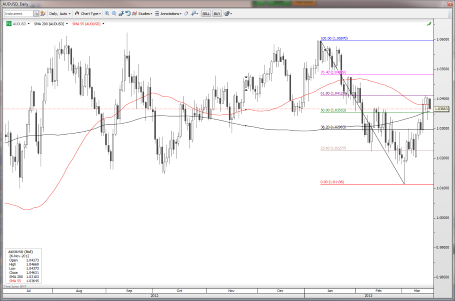Cyprus situation remains unresolved, wearing on market confidence in the EU. UK inflation data is due, as well asthe latest on the key risks surrounding tomorrow’s FOMC meeting.
Cyprus between a rock and a hard place
Cyprus politicians continue to dither on how they will proceed, as the EU would like them to protect small depositors. Russia, which had extended a lifeline to the country, doesn’t want large depositors targeted exclusively. It’s hard to gauge the risk that no deal is struck at all, as the latest is that Cyprus has decided to keep banks closed until Thursday at least. The blogosphere and media are swarming with endless stories on the issue. The Cyprus parliament will meet at 1600 GMT today.
Looking ahead
The German ZEW is up at 1000 GMT as we near the highest readings in the survey’s history. The DAX pushing 8000 recently makes it hard to see why the survey will be anything but strong, but the focus for Europe is of course elsewhere, so impact should be rather limited.
The US NAHB Housing Survey was weaker than expected, and has now dropped two months running. I looked into various indicators some time back, and found this one to the be the most leading of U.S. housing indicators. It suggests that the momentum is coming out of US housing. Today we have Housing Starts and Building Permits. Last month’s starts figures were disappointing, and another disappointment may mean that one of the US’ strongest spots of late is beginning to fizzle.
FOMC on tap tomorrow:
The Wall Street Journal’s Hilsenrath yesterday published a short piece, urging readers to pay attention to Jeremy Stein, a Fed Board of Governors member. He gave a long speech back in February about the risks that credit markets were becoming overheated. Stein is probably one of the key forces behind the noise in between the lines on “unintended consequences” of Fed policy, a phrase that even Bernanke himself has uttered on at least one occasion. I have long been convinced that this is the angle from which the Fed’s monetary policy gets it into trouble in the more immediate time frame, rather than the longer term problem of inflation (which is easier to keep down for longer due to the output gap / high underemployment) and the ongoing desire in the private sector to continue to deleverage.
The question is: as equities have stretched to all-time highs (yes, the S&P500 is just off those all time highs, but the equal-weighted S&P500, representing the average equity in the index, is almost 15% above the 2007 high) and as junk bonds have moved into bubble territory, whether the Fed begins to step up the cautionary rhetoric – more from the worry that policy is raising the risk of a disruptive move in financial markets. It may be too late for this thinking. If confidence on the strike price of the Fed put is lost, any hint of an “irrational exuberance” turn of phrase from the Fed could prove disruptive. This is the key angle to observe with tomorrow’s monetary policy statement and Bernanke's press conference.
Chart: AUDUSD
The AUD/USD is not a chart much in focus lately, but it is interesting that the stall-point we have reached here in the rally is at the 0.618 Fibo level. We have a key event risk up tomorrow in the form of the FOMC meeting, so if there is going to be a pivot back lower – this is a possible time frame for such a development. AUD/USD" title="AUD/USD" width="455" height="301">
AUD/USD" title="AUD/USD" width="455" height="301">
UK Budget
The thinking that an ongoing message of austerity from Osborne’s budget will mean a higher risk of economic weakness, and as such the higher risk of an activist BoE is pound negative. If Osborne is seen backing off a little, the pound could be better from a hope-for-growth angle, which would probably outweigh any “risk of further downgrades” thinking for now, but let’s wait and see. The market is going to vote one way or another, as this budget is highly anticipated. Also important are today’s inflation figures, as BoE officials have expressed the willingness to look through high inflation. To be fair, core inflation is back below the 2.5% year-on-year range, but we can expect headline inflation to run a bit higher for a while due to the sterling's recent sharp weakening .
Economic Data Highlights
- Japan Feb. Nationwide Department Store Sales out at +0.3% YoY vs. +0.2% YoY in Jan.
- UK Feb. PPI Input/Output (0930)
- UK Feb. CPI and RPI (0930)
- Euro Zone Jan. Construction Output (1000)
- Germany Mar. ZEW Survey (1000)
- Euro Zone Mar. ZEW Survey (1000)
- Canada Jan. Manufacturing Sales (1230)
- US Feb. Housing Starts and Building Permits (1230)
- US Weekly API Crude Oil and Product Inventories (2030)
- New Zealand Q4 Current Account Balance (2145)
